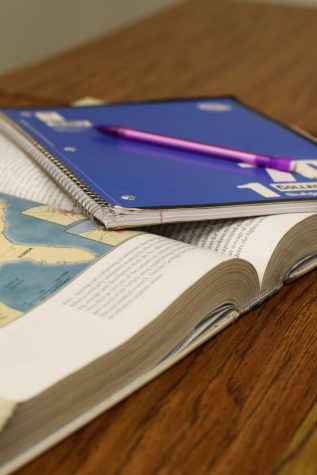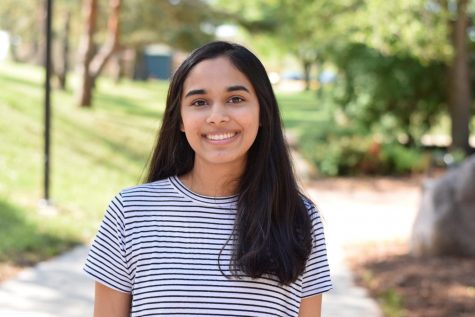Taking the “home” out of homework
This year, AP Psychology teacher Travis Henderson has adopted a new method of teaching that, to the delight of many students, involves less homework.

AP social studies classes at West usually require students to complete lengthy readings every night.
Prior to this school year, AP Psychology teacher Travis Henderson taught his class like most social studies courses at West: nightly textbook readings followed by in-class lectures over the material. Those who have taken other AP social studies classes at West will find the pattern quite familiar: read, lecture, read, lecture, read, lecture, review, exam. This system can cause a lot of stress, especially if reading assignments are dense and difficult. This makes it very easy to fall behind, leaving students with hours of work to do for a single class.
“When you start looking at two-and-a-half, three-and-a-half, four-and-a-half hours … the benefits of [homework] just start to drop dramatically,” Henderson said.
At first glance, less time spent in class going over textbook readings might seem like it would lead to a weaker understanding of the material. This becomes a more pressing issue considering the fact that students might depend on in-class lectures more so than textbook readings. This approach places more responsibility on the students to actually read the textbook since not everything will be covered in class. To remedy this, Henderson has designated “practice days” that give AP Psychology students the opportunity to read the textbook in class and to ask questions as they read, leaving them with considerably less homework.
Henderson structures the course so that class lecture time is spent going over areas students have questions on rather than simply restating entire sections of the textbook. “Instead of lecturing at you about the stuff you’re going to read anyway, why don’t we spend some of that time reading and then some of that time asking questions about the reading?” Henderson said.
Lauren Ernst ’18, Henderson’s former student, recalls that Henderson’s class lectures really cemented key concepts for her.
“Everything overall generally made sense, but it made so much more sense after hearing [Henderson] talk about it,” Ernst said.
The only other regular assignments Henderson asks of his students are “checks for understanding,” which are short quizzes on Canvas that allow students to make sure that they understand content and see what they need to work on. Out of 108 students who responded to an anonymous survey conducted by Henderson, 102 students reported that “checks for understanding” were beneficial to them. Additionally, specific class days are allotted for question-and-answer sessions, in which students can anonymously post questions they have over content to be answered in a big group discussion format. This way, students who are anxious about asking questions in front of the class won’t have to face peers’ judgement.
Xena Makky ’18, who is currently taking Henderson’s AP Psychology class, really enjoys the way Henderson has approached teaching the class this year.
“Now I can focus on learning the content rather than worrying about how much I need to complete before the next day,” Makky said.
Henderson’s other students seem to agree. Henderson’s survey found that over 75 percent of his students reported that class time spent going over specific questions in the reading really helped them. In implementing his new system this year, Henderson has found that one huge benefit is that time is used more efficiently.
“We actually moved about a week and a half faster than we have in the past … and we had no statistically significant difference from last year in terms of accomplishment,” Henderson said.
Although Henderson is still figuring out some of the specifics of his approach, it seems to be working well for him and his students.
Your donation will support the student journalists of West High School. Your contribution will allow us to purchase Scholarship Yearbooks, newsroom equipment and cover our annual website hosting costs.

Eman Elsheikh is a senior at West High. It is her first year on staff and she is a Broadcast videographer. When she's not working on videos, Eman watches...

Pareen Mhatre is a senior and she is the Photo Editor and Online Managing Editor. This is her second year on staff. In her free time,...



Dr. hani Elkadi • Sep 24, 2017 at 12:08 am
A great article. That is precisely the way we taught at CEC (1976 – 1998), SHAC (1999 – 2004), and Tate ( (2004-2010) Alternative high schools. I am happy that our instruction methods and strategies are currently pursued by some educators. Dr. Hani Elkadi, former Biology, health, Chemistry, and Art, Iowa City Community School District.